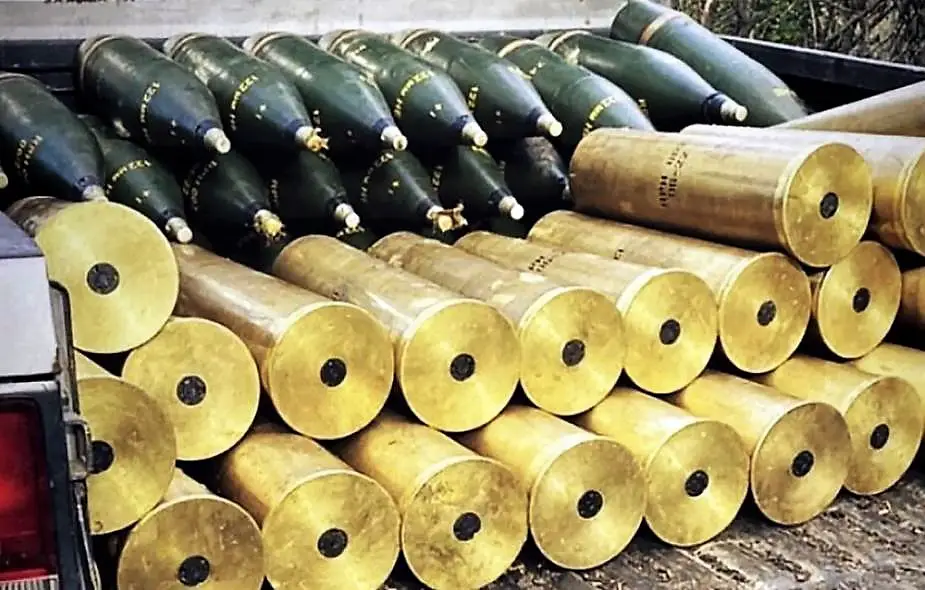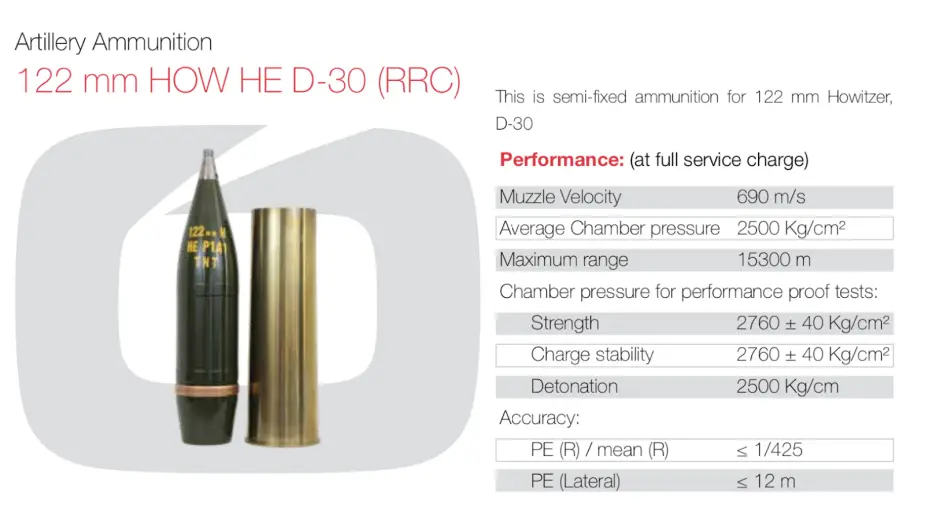Breaking news
Pakistan sending large quantity of artillery ammunition to Ukraine.
According to The New Voice of Ukraine on January 10, Pakistani shipping and brokerage firm Project Shipping plans to deliver 159 containers of ammunition for Ukraine – from the port of Karachi to Gdansk, Poland, in the second half of January. In exchange, Pakistan may receive Ukrainian assistance in the modernization of its Mi-17 helicopters.
Follow Army Recognition on Google News at this link

The Commander of the Ukrainian Ground Forces, Oleksandr Syrskyi, said that artillery shell consumption in the Russia-Ukraine war is comparable with WWII levels (Picture source: Twitter via The Drive)
Pakistan is preparing to send more than a hundred containers of ammunition to Ukraine in January, The Economic Times reported on Jan. 9, citing people familiar with the matter. According to the sources, Pakistani shipping and brokerage firm Project Shipping plans to deliver 159 containers of ammunition for Ukraine – from the port of Karachi to Gdansk, Poland, in the second half of January. The Economic Times noted that BBC Vesuvius ship will ferry crates full of 155mm artillery shells, M4A2 propelling bag charges, M82 primers, and PDM fuses – all vital supplies needed to sustain Ukrainian artillery units.
The Commander of the Ukrainian Ground Forces, Oleksandr Syrskyi, said that artillery shell consumption in the Russia-Ukraine war is comparable with WWII levels. Hence, NATO Secretary General Jens Stoltenberg urged alliance members to increase arms production to support Ukraine, since NATO has depleted most of its stocks of surplus weapons and ammunition.
The Kyiv Post on January 12 writes that Ankara in November launched deliveries of dual-purpose improved conventional munitions (DPICMs) to Ukraine at Washington’s request, the authoritative U.S. magazine Foreign Policy wrote in a Jan. 10 article. DPICMs are designed to destroy tanks by bursting into smaller submunitions. The U.S.-designed 155mm howitzer shell scatters about 88 anti-tank bomblets. Although the U.S. is not a signatory to the 2008 Convention on Cluster Munitions, U.S. law bars American firms from exporting DPICMs because of the weapon’s high dud rate and the danger that unexploded submunitions might pose to civilians.
Ukraine almost ran out of Soviet-standard artillery ammunition in April, forcing its army to hastily incorporate NATO-standard 155mm howitzers and shells into its inventory and train gunners to use these weapons. The U.S. Foreign Policy report went public 48 hours after India’s Economic Times newspaper, in a January 8 article, reported Pakistan would soon dispatch 159 containers of 155mm howitzer shells, propellant bags, primers and fuses to Ukraine via Poland. Cluster munitions were not mentioned.
Islamabad’s defense industry may in return receive Ukrainian assistance to upgrade Pakistani Mi-17 helicopters, the newspaper reported. Ukraine in the past was a major arms supplier to Pakistan, from 1991 to 2020, delivering $1.6 billion in weapons including hundreds of T-80UD tanks.
More recently, Islamabad has assisted Ukraine by opening the Nur Khan air base in Rawalpindi to British military transport planes flying Ukraine-bound arms to Europe, the article said. Indeed, beginning on August 6, open-source intelligence began to reveal that a Royal Air Force C-17 Globemaster III transport aircraft (serial ZZ143) was conducting almost daily flights from Romania’s Cluj International Airport or RAF Akrotiri in Cyprus to Pakistan’s Nur Khan Air Base. Over the course of 15 days, the C-17 Pakistan-Romania airlift effort completed a total of 12 trips, Elisabeth Gosselin-Malo writes in The Drive.
While we don't know exactly what those aircraft were carrying, Elisabeth Gosselin-Malo adds, evidence of 122mm HOW HE-D30 artillery shells manufactured by the Pakistan Ordnance Factories (POF) in Ukrainian hands subsequently emerged. In one video gone viral on social media, where the POF 122-mm shells are seen being unpacked, it is possible to identify them based on several elements including the specific British-style steel-box packaging typically used by the company and the LIU-4 type fuzes that are also distinctive to POF’s Soviet-type 122mm artillery. The POF’s 122mm HOW HE-D30 projectiles are semi-fixed ammunition for howitzers, with a maximum range of 9.5 miles and a muzzle velocity (the speed at which the projectile leaves the barrel) of 2,270 feet per second (690 meters/s.) The complete weight of the round, taking into account the projectile and shell, is about 28 pounds.
While no flights have been tracked between these destinations since August 22, it appears that the Pakistan-made projectiles are now in the hands of Ukrainian troops.

The POF’s 122mm HOW HE-D30 projectiles are semi-fixed ammunition for howitzers, with a maximum range of 9.5 miles and a muzzle velocity (the speed at which the projectile leaves the barrel) of 2,270 feet per second (690 meters/s) (Picture source: POF)

























